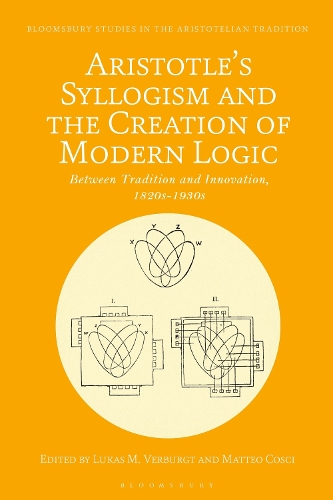
Aristotle's Syllogism and the Creation of Modern Logic: Between Tradition and Innovation, 1820s-1930s
(Paperback)
Available Formats
Publishing Details
Aristotle's Syllogism and the Creation of Modern Logic: Between Tradition and Innovation, 1820s-1930s
By (Author) Lukas M. Verburgt
Edited by Matteo Cosci
Bloomsbury Publishing PLC
Bloomsbury Academic
22nd August 2024
United Kingdom
Classifications
Professional and Scholarly
Non Fiction
Philosophy: logic
Mathematical logic
166
Physical Properties
Paperback
320
Width 152mm, Height 234mm, Spine 18mm
473g
Description
Offering a bold new vision on the history of modern logic, Lukas M. Verburgt and Matteo Cosci focus on the lasting impact of Aristotles syllogism between the 1820s and 1930s. For over two millennia, deductive logic was the syllogism and syllogism was the yardstick of sound human reasoning. During the 19th century, this hegemony fell apart and logicians, including Boole, Frege and Peirce, took deductive logic far beyond its Aristotelian borders. However, contrary to common wisdom, reflections on syllogism were also instrumental to the creation of new logical developments, such as first-order logic and early set theory. This volume presents the period under discussion as one of both tradition and innovation, both continuity and discontinuity. Modern logic broke away from the syllogistic tradition, but without Aristotles syllogism, modern logic would not have been born. A vital follow up to The Aftermath of Syllogism, this book traces the longue dure history of syllogism from Richard Whatelys revival of formal logic in the 1820s through the work of David Hilbert and the Gttingen school up to the 1930s. Bringing together a group of major international experts, it sheds crucial new light on the emergence of modern logic and the roots of analytic philosophy in the 19th and early 20th centuries.
Reviews
This volume brings to light the continuing importance of the syllogism in the development of logic in the nineteenth century. It gives much deserved attention to many neglected figures as well as deepens our understanding of Frege and much of the logical research that followed him into the twentieth century. * Sean Morris, Professor of Philosophy, MSU Denver, USA *
This is an excellent collection of papers, deepening our understanding of the important role, all too often overlooked, that engagements with traditional syllogistic logic played in the development of modern logic. It opens up a whole range of issues that will set the agenda for future historical and philosophical research. * Michael Beaney, Regius Professor of Logic, University of Aberdeen, UK, and Professor of History of Analytic Philosophy, Humboldt University of Berlin, Germany *
By showing that the founding figures of modern mathematical logic have also infused new life to the old Aristotelian doctrine of the syllogism, these essays invite us to rethink the contrast between modern and traditional logic. Authored by a team of world-class experts, the collection is an important addition to the history of logic and testifies to the liveliness and versatility of Aristotles logical views. * Paolo Fait, Anthony Quinton Fellow and Tutor in Classical Philosophy, New College, University of Oxford, UK *
Author Bio
Lukas M. Verburgt is Gerda Henkel Stiftung Research Scholar and affiliated to the Netherlands Institute for Advanced Study in the Humanities and Social Sciences (NIAS), the Netherlands. Matteo Cosci is Research Fellow at the Department of Philosophy and Cultural Heritage of Ca' Foscari University Venice, Italy.
